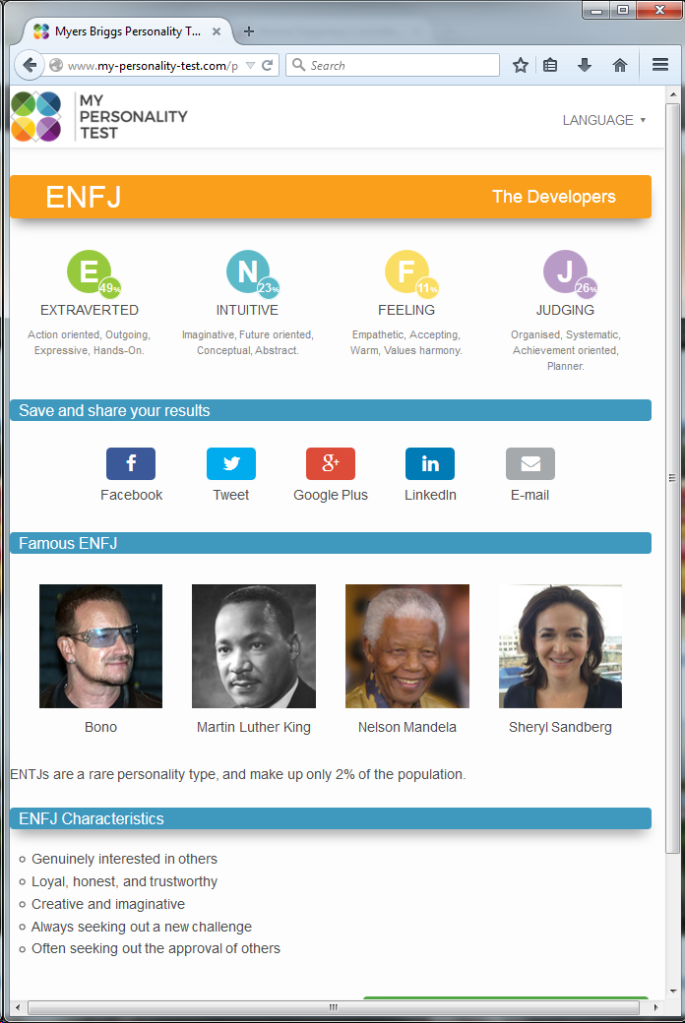 Try it yourself and learn about yourself. Link Here.
Try it yourself and learn about yourself. Link Here.Strengths
ENFJs are enthusiastic, goal-oriented, diplomatic, responsible, and caring. They firmly believe in other people, almost to a fault, and are very altruistic. ENFJs primarily focus on what’s going on around them, and are especially concerned with the wellbeing of others. In fact, ENFJs are often described as social butterflies, as they love spending time with others. In return, people love spending time with ENFJs—they are fun to be around, and are usually very straight-forward and confident. People with this personality type may often be described as charming and likeable. ENFJs are always willing to help others when needed, and enjoy doing so.
They hold strong values and opinions, and advocate for what they believe in. They are decisive and are able to see the big picture when presented with a complex situation. ENFJs make decisions by going with their gut. Their values play a large role in driving your decision-making processes, and they always try to act in accordance with their values. ENFJs’ secondary focus is internally, where they make judgments based primarily on your intuition.
ENFJs operate largely internally and are able to see the “big picture” very easily. They are able to understand things through their strong sense of intuition, and often can’t pinpoint specific reasons.
Regarding the outer world, they are highly organized, and are able to handle several projects simultaneously. They are excellent at setting priorities and developing plans.
Weaknesses
ENFJs possess a high degree of empathy, leading them to always see the best in others. Because of their incredible empathy ENFJs, may sometimes place too much trust in others. This may make it easy for others to disappoint ENFJs or take advantage of them.
In addition, ENFJs may be prone toward immersing themselves in activities that involve other people because of their social nature. However, ENFJs must be careful not to make choices and define their priorities based solely on what others want—this may result in neglecting their own needs and losing one’s sense of purpose. It is critical that ENFJs do not sacrifice their own wellbeing and aspirations to help others.
Although they have very strongly held beliefs, ENFJs often have difficulty revealing their true identities and values. They are very deep, complex people. Because ENFJs are naturals at interacting with and understanding others, they may be “chameleon-like” interactions instead of revealing their true selves.
Finally, ENFJs often seek out the opinions of others, but may have a hard time accepting criticism. They may become reliant on others’ approval to validate their self-worth.
Personal RelationshipParenthood
ENFJs take parenting very seriously. They have little difficulty developing close relationships with their children, and are very warm, supportive, and responsible parents. ENFJs take the task of instilling strong values and goals in their children very seriously, and constantly aim to be good role models for their children.
Because ENFJs hold themselves to such a high standard of parenting, they sometimes have a tendency to become strict and controlling parents. They may often push their children toward sharing their own ideals and values. ENFJs must remember to allow their children to make mistakes and be able to learn on their own.
Romantic Relationships
ENFJs’ social nature gives them a strong desire for close, intimate relationships, and ENFJs are willing to put in the effort to achieve this. Initially, ENFJs may have trouble opening up to their significant other. They do best with a deeply caring partner who is a great listener. Once ENFJs do open up though, ENFJs are usually great at maintaining these relationships by being affectionate, loyal, and trustworthy. ENFJs are often drawn to other Feeling personality types, with similar values as themselves.
Friendships
ENFJs make friends easily — they have a genuine interest in others. They have the ability to relate to a variety of people if necessary, but may choose not to spend time around different personality types. In particular, ENFJs may choose to avoid Sensing and Perceiving types, whose carefree attitude may conflict with ENFJs beliefs.
CareerWork Habits
ENFJs put relationships first in nearly every aspect of their lives, and this is apparent in the workplace. ENFJs are the ultimate team-players. ENFJs are great employees because of their strong multitasking, organizational, and communicative abilities. They are often described as hardworking and willing to help. However, people with this personality type have trouble dealing with conflict. They avoid conflict at all-costs, and also avoid unnecessary criticism.
In addition, ENFJs always have an open-door policy. No matter what they are doing, they will always take the time to meet with another colleague who stopped by with a question, giving him/her their undivided attention. They get much satisfaction from helping others.
Career Paths
ENFJs social nature and warm disposition make them well-suited for human service industries. People with this personality type may be good psychologists, social workers, teachers, clergy members, sales representatives, managers, human resources staff members, politicians, diplomats, entrepreneurs, and writers.
ENFJs are incredibly creative, yet are organized. They thrive in a workplace which allows them to “mix things up” from day-to-day. ENFJs have trouble with repetitive work, or work in which they are not able to interact with others. In addition, because ENFJs rely so much on their intuition and values, they are usually not well-suited for jobs that rely on impersonal logic.

